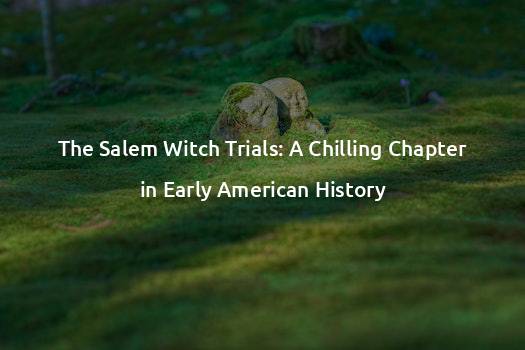The Salem Witch Trials: A Chilling Chapter in Early American History
The Salem Witch Trials: A Chilling Chapter in Early American History
The Salem Witch Trials of 1692 were a dark and harrowing time in colonial America. The events that unfolded during this period serve as a reminder of the dangers of ignorance, fear, and mass hysteria. In this article, we will delve into the details of the Salem Witch Trials, exploring their origins, causes, impact, and lessons learned.
Origins of the Salem Witch Trials
The seeds of the Salem Witch Trials were sown in January 1692 when several young girls in Salem Village, Massachusetts, including Betty Parris and Abigail Williams, began experiencing strange and seemingly supernatural symptoms. They suffered from fits, screaming episodes, convulsions, and claimed to be tormented by unseen forces.
The local doctor, unable to provide a medical explanation for these mysterious afflictions, concluded that the girls were bewitched. This diagnosis sparked a chain reaction that led to one of the most infamous witch hunts in history.
The Causes and Accusations
The Puritan society of colonial Massachusetts was highly religious and held firmly to the belief in witchcraft. Any unusual or unexplainable occurrence was often attributed to the work of witches. When the girls’ afflictions were associated with witchcraft, paranoia and fear gripped the community.
The accusations of witchcraft began with the girls, but soon spread to other members of the community. People were accused based on hearsay, rumors, and personal vendettas. Finger-pointing and accusations were rampant as the community descended into a frenzy of suspicion.
The Trials and Executions
The Salem Witch Trials unfolded in a series of court proceedings, where the accused were presumed guilty unless they could prove their innocence. Spectral evidence, testimonies provided by the afflicted girls claiming to see the spirits of those allegedly bewitched, played a significant role in the trials.
A total of 19 innocent men and women were hanged for witchcraft, with one man, Giles Corey, being pressed to death under large stones. Several others died in jail due to the brutal conditions they endured while awaiting trial.
The Impact and Aftermath
The Salem Witch Trials sparked a wave of fear and panic throughout colonial Massachusetts. Communities became divided, as friends and neighbors turned against one another in the pursuit of self-preservation. The fabric of society was torn apart, leaving a scar that would take years to heal.
However, as the trials continued, doubt began to creep in. People started to question the validity of spectral evidence and the fairness of the proceedings. This skepticism, combined with the influential protests of figures like Increase Mather, eventually led to the dissolution of the special court established to try the accused witches.
Lessons Learned
The Salem Witch Trials serve as a chilling reminder of the dangers of mass hysteria, ignorance, and the disregard for due process. Innocent lives were lost due to unfounded accusations based on superstition and fear. The aftermath led to a reevaluation of the legal system, the acceptance of scientific reasoning, and ultimately, the recognition of the importance of individual rights and justice.
Today, the Salem Witch Trials stand as a stark warning against the scapegoating of individuals and the dangers of unchecked belief systems. They serve as a somber reminder of how easily fear and ignorance can cloud judgment and lead to unspeakable atrocities.
TLDR;
The Salem Witch Trials were a dark chapter in early American history marked by ignorance, fear, and mass hysteria. Sparked by the afflictions of young girls, accusations of witchcraft spread throughout the community. A total of 19 innocent men and women were hanged, and many more suffered in jail. The trials left a lasting impact on society, dividing communities and leading to a reevaluation of the legal system. The Salem Witch Trials serve as a powerful lesson on the dangers of mass hysteria and the importance of due process and individual rights.







